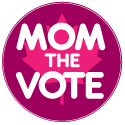“On no!” He was down on his knees on the sidewalk, holding his head in despair.
“What? What is it, Colum?”
“Not Peggy Nash! It’s another Peggy Nash sign.”
I quickly look around to make sure nobody is hearing this. “What do you mean, Colum? What’s wrong with Peggy Nash?”
“But Mom, you told me we were rooting for the Liberals.”
***
It must have been the very first day of the federal election campaign, just as signs were starting to appear, when Colum asked me who I was voting for. I think I mumbled something like, “Oh probably the Liberals, sweetie, but we’ll see.” And that was that.
But as the Toronto Maple Leafs hockey season drew to a close, clearly the boy needed something to root for with all the die-hard loyalty of a sports fan. This has taken the rather embarrassing form of loudly cheering for the Parkdale/High Park Liberal candidate and booing the riding’s NDP candidate. (Sorry, Ms. Nash.) (Never mind that we technically live across the border in another riding — those are the signs he sees.) I’ve tried to explain that I actually think that both are good candidates (which I do) and that he shouldn’t get too carried away in the sign race.
The truth is that I’m not politically partisan and it pained me to see my son so eager to don the colours of one party or another. (Not that it’s easy for a 5-year-old to participate in any other way.) My political views have probably mellowed out as I’ve gotten older and no longer carry the Communist Manifesto with me everywhere. (Kidding. That was just for the one class.) They’ve also become more pragmatic. A party or candidate’s ideological position on the political spectrum doesn’t necessarily carry more weight than their views on child care and maternity benefits, education or funding for extracurricular programs.
But I also care about issues that are less obviously linked to my role as a parent. Federal funding for public transportation and the arts, and policies about health care and immigration affect our lives as a whole. My views on these also reflect the kind of options I want my children to have in the city where I live. I fully expect my kids to be use public transportation to go downtown to soak up some culture in a multicultural city. The good I want for them isn’t really any different from the good I want for the nation as a whole.
My politics, therefore, are going to be a lot different from those of many other parents. Of course they are. There are families who live in the country or the suburbs and for whom public transportation is a non-issue. There are people who believe the arts are a frill and that immigrants will be competing with their children for jobs. There are as many different political views among parents as there are among anyone. This is all just to say that there’s not going to be a magical “mommy platform” that’s going to win a party the support of a whole demographic. That’s just not the way it works.
But as much as I decide how best to direct my family’s spending at the grocery store, I also shape the way my kids see the world. Is socialism a good or bad word? Is politics? The best way to raise engaged citizens is to act like ones ourselves.


 I’ve expressed my dismay over the costs of recreating at Toronto’s community centres
I’ve expressed my dismay over the costs of recreating at Toronto’s community centres